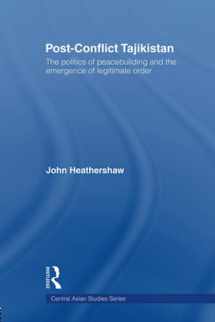
Post-Conflict Tajikistan (Central Asian Studies)
ISBN-13:
9780415620086
ISBN-10:
0415620082
Edition:
1
Author:
John Heathershaw
Publication date:
2011
Publisher:
Routledge
Format:
Paperback
236 pages
FREE US shipping
Book details
ISBN-13:
9780415620086
ISBN-10:
0415620082
Edition:
1
Author:
John Heathershaw
Publication date:
2011
Publisher:
Routledge
Format:
Paperback
236 pages
Summary
Post-Conflict Tajikistan (Central Asian Studies) (ISBN-13: 9780415620086 and ISBN-10: 0415620082), written by authors
John Heathershaw, was published by Routledge in 2011.
With an overall rating of 3.9 stars, it's a notable title among other
books. You can easily purchase or rent Post-Conflict Tajikistan (Central Asian Studies) (Paperback) from BooksRun,
along with many other new and used
books
and textbooks.
And, if you're looking to sell your copy, our current buyback offer is $0.3.
Description
Post-Soviet, post-conflict Tajikistan is an under-studied and poorly understood case in conflict studies literature. Since 2000, this Central Asian state has seen major political violence end, countrywide order emerge and the peace agreement between the parties of the 1990s civil war hold. Superficially, Tajikistan appears to be a case of successful international intervention for liberal peacebuilding, yet the Tajik peace is characterised by authoritarian governance. Via discourse analysis and extensive fieldwork, including participant-observation with international organizations, the author examines how peacebuilding is understood and practised. The book challenges received wisdom that peacebuilding is a process of democratisation or institutionalisation, showing how interventions have inadvertently served to facilitate an increasingly authoritarian peace and fostered popular accommodation and avoidance strategies. Chapters investigate assistance to political parties and elections, the security sector and community development, and illustrate how transformative aims are thwarted whilst ‘success’ is simulated for an audience of international donors. At the same time the book charts the emergence of a legitimate order with properties of authority, sovereignty and livelihoods. Providing a challenge to the theoretical literature on peacebuilding and concentrating on an under-studied Central Asian state, this book will be of interest to academics working on Peace Studies, International Relations and Central Asian Studies.


We would LOVE it if you could help us and other readers by reviewing the book
Book review

Congratulations! We have received your book review.
{user}
{createdAt}
by {truncated_author}


